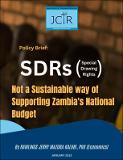Special Drawing Rights: Not a Sustainable Way of Supporting Zambia's National Budget
Date
2023-02-28Author
Jesuit Centre for Theological Reflection
Type
BriefingItem Usage Stats
62
views
views
24
downloads
downloads
Abstract
In August 2021, the International Monetary Fund (IMF) allocated by far the largest allocation to date of Special Drawing Rights (SDRs) amounting to SDR 456.5 billion (equivalent to about US$650 billion). The purpose of this allocation was to address the long-term global need for reserves, build confidence, foster the resilience and stability of the global economy and help countries cope with the impact of the COVID-19 pandemic. At the time of this allocation, most countries in Africa were facing serious economic challenges which were exacerbated by the effects of the Covid-19 Pandemic. External financing to help the African continent recover was not available because most of the countries in Europe, North America and even China itself were trying to solve economic woes of their own which the pandemic had inflicted on their respective economies. Therefore, the IMF allocation of the 2021 SDRs provided much needed financing for African countries which had no other alternative ways to finance their way out of the Covid-19 Pandemic. The study showed that SDRs funded the Constituency Development Fund (CDF)’s Youth & Women Empowerment Funds in the Ministry of Local Government and Rural Development as well as the Ministry of Health (Grants to the hospitals, and Drugs, Medical Supplies, Equipment & Covid-19 Vaccines), Ministry of Community Development and Social Services (Food Security Pack and Social Cash Transfer), and the deficit gap in the Public Service Pensions Fund (PSPF).
The Zambian Government received SDR 937.6 which was approximately US $1.3 billion (Zambian Business Times, 2021). It decided to use its SDRs to boost its foreign exchange reserves and it also used some SDRs to support its 2022 budget to fund social sector expenditure. The scope of this study was to assess the allocation and use of SDRS in Zambia between January and May 2022. The methods employed to carry out the study were document review, key informant interviews, thematic analysis of narratives from key informants and graphical analysis.

